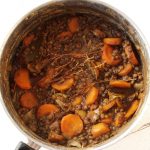 A well-seasoned meat, foul or fish stew.
A well-seasoned meat, foul or fish stew.
A ragout is a highly spiced dish of meat and vegetables. Originally, ragouts were given their strong seasoning because they were intended to excite or revive the appetite. In the middle of the seventeenth century, this function gave the dish its name, as ragout derives from the French ragouter, a word compounded from the prefix re, meaning back or again, and goiiter, meaning to taste. The history of the French verb gouter can also be traced further back: it developed from the Latin gustare, also meaning to taste, which derived in turn from an Indo-European source that also gave us, through another line of development, the word choose. The link in meaning between taste and choose is still evident when we say something like, “He has good taste”—in other words, “He’s choosey.” The word ragout is closely related to a culinary phrase used in English since the middle of the seventeenth century, but which has never lost its French associations: haut-gout, meaning high taste or, more idiomatically strong flavour. Two other words adopted by English are also cousins to ragout. The first, gusto, entered English from Italian after shifting its meaning from taste to zeal; the second, disgust, originally meant to ruin the taste before developing its broader, current sense. Both words, like ragout and haut-gout, appeared in English in the middle of the seventeenth century.
A succulent concoction comprised of tender morsels of meat or poultry, accompanied by an assortment of vegetables, undergoes an initial browning in a modest amount of fat before embarking on a gentle simmer. This delectable dish lends itself to various flavor profiles, as it can be enriched with the earthiness of mushrooms, the depth of port wine, the tang of tomatoes, and more. When this hearty medley features lamb as its star, it is commonly referred to as Navarin, paying homage to its French origins. Conversely, a white ragout, exemplified by the beloved Irish stew, shuns the browning process and relies solely on the potatoes cooked within for its natural thickening agent.
